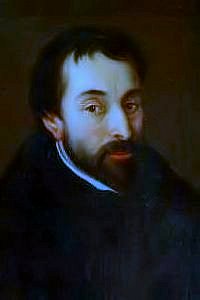Introduction

1591–1635
Born: February 25, 1591, Kaiserswerth, Germany.
Died: August 7, 1635, Trier, Rheinland-Pfalz, Germany.
Buried: Jesuitenkirche, Trier, Germany.

Born: February 25, 1591, Kaiserswerth, Germany.
Died: August 7, 1635, Trier, Rheinland-Pfalz, Germany.
Buried: Jesuitenkirche, Trier, Germany.
Friedrich was the son of Peter Spee, a judge at Kaiserswerth.
He was educated in the Jesuit gymnasium at Cologne, entered the order of the Jesuits there on Sept. 22, 1610, and was ordained priest about 1621. From 1613 to 1624 he was one of the tutors in the Jesuit college at Cologne, and was then sent to Paderborn to assist in the Counter Reformation.
In 1627 he was summoned by the Bishop of Würzburg to act as confessor to persons accused of witchcraft, and, within two years, had to accompany to the stake some 200 persons, of all ranks and ages, in whose innocence he himself firmly believed (his Cautio criminalis, sen de processibus contra sagas lib, Rinteln, 1631, was the means of almost putting a stop to such cruelties).
He was then sent to further the Counter Reformation at Peine near Hildesheim, but on April 29, 1629, he was nearly murdered by some persons from Hildesheim.
In 1631 he became professor of Moral Theology at Cologne. The last years of his life were spent at Trier, where, after the city had been stormed by the Spanish troops on May 6, 1635, he contracted a fever from some of the hospital patients to whom he was ministering, and died there Aug. 7, 1635. (Koch, iv. 185; Goedeke’s Grundriss, vol. iii., 1887, p. 193, &c.)
Spee was the first important writer of sacred poetry that had appeared in the German Roman Catholic Church since the Reformation. Among his contemporaries he was noteworthy for the beauty of his style, and his mastery of rhythm and metre. He seems to have come independently to much the same conclusions regarding measure and accent, and the reform of German prosody as did Opitz. He was however of a much deeper and purer nature than Opitz; and far surpasses him in originality, in imagination, and in poetic inspiration.
His poems are characterised by a very keen love for the works of God in the natural world, and a delight in all the sights and sounds of the country, especially in spring and summer; and at the same time by a deep and fervent love to God, to Christ, and to his fellowmen. On the other hand his mannerisms are very pronounced; the pastoral imagery and dialogue which he is fond of using jar upon modern ears when used on such serious subjects as the Agony in Gethsemane. In the hymns to Jesus he is too subjective and sentimental, and works out the idea of Christ as the Bridegroom of the soul with unnecessary detail.
His poems are often full of beauty, of pathos, and of genuine religious warmth, but they cannot be considered as suitable for public worship, and hardly any really came into use except as processionals sung by the people at the great festivals or at outdoor gatherings. A number passed into the Roman Catholic hymnbooks of the 17th century, and one or two still survive.
His earlier poems are included in his (1) Trutz Nachtigal, oder Geistlichs-Poetisch Lust-Waldlein, &c, Cologne, 1649. [British Museum, Berlin Library, &c. The manuscript of this work, completed in 1634, is in the Town Library of Trier.] This is Spee’s most important book; reached a 5th edition in 1683, and has been several times reprinted in this [the 19th] century. A few of the hymns had appeared in the Seraphisch Lustgart, Cologne, 1635; the Geistlicher Psalter, Cologne, 1638, and other Jesuit books. (2) Güldenes Tugend-Buch, &c, Cologne, 1649 [Gottingen Library]. This is a prose work on the Christian Graces of Faith, Hope, and Love, and has a few hymns interspersed.